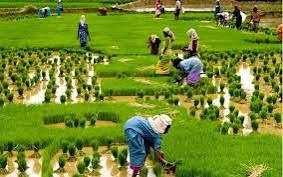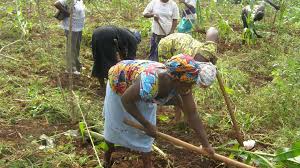Last Thursday, small holder women farmers across 28 states of the federation converged on Abuja to rub minds on challenges confronting women farmers. In this report, AMEH EJEKWONYILO captures the expectations of these women farmers from the incoming government of General Muhammadu Buhari in the area of policy formulation and implementation in small scale farming for women in the country.
The President-elect, General Muhammadu Buhari has been urged to pay attention to the challenges confronting small holder women farmers in the country.
The women under the aegis of Small Scale Women Farmer’s Organisation in Nigeria (SWOFON), advocated for inclusion in policy making process in trying to address their needs.
SWOFON, in a communique issued at the end of its 2nd forum in Abuja, lamented the non-involvement of women farmers in policy making processes, which they said is due to the absence of spaces and processes through which smallholder women farmers can engage with policy makers.
The women who spoke through their President, Mrs. Sarah Yapwa, called on the incoming administration to review Nigeria’s land policy so that women can easily own lands for their farming and also to facilitate easy access to credit facilities to small holder women farmers.
“We are calling on government to make the credit cheaper so that the interest rate could be less and the process of getting the loan should be made easy because small scale women farmers have not really been able to assess it,” she pointed out.
The communiqué read: “There has been a significant number of agricultural policies and programs developed at the national, state, and local level in Nigeria, despite this, most policy and programme targets, especially those involving smallholder women farmers, are not met due to poor implementation.
“For example, ten years after signing the Maputo Declaration Commitment on Agriculture and Food Security in Africa, Nigeria continues to fall short of committing the minimum 10% of the federal budget to agriculture, with annual allocations having reduced from 1.7% in 2013 to 1.44% in 2014 and 0.9% in 2015.”
In order to further strengthen the capacity of smallholder women farmers, they have called on various development partners to continue to support them through the financing of their programmes so that they can sustain the momentum and scale up their activities.
For Mrs. Mary Akpan, a small scale farmer from Nassarawa state, the major challenge they face, is access to land for farming activities.
“We really lack access to land, as women, if you plant in a plot of land this year, by next year, either your husband or the brother will say he has a need for it. We want the government to look into land policies so that we women can own our own lands too.
“Our other major problem is credit; for the fact that we do not own lands, we don’t have collateral to collect loans from the banks and in most cases, we don’t even have access to the money,” she said.
Even if you access the money, the interest rate is very high, government should find a means of reducing the interest rate to about 5%, so that we will be able to use it and pay the loan back, so we can be able to move from small scale farmers to large scale,” she added.
Earlier in her address at the forum address, Tasallah Chibok, Head of Program Quality,
ActionAid Nigeria, said that, the parley was part of its Country Strategy Paper objective 1 on strengthening people’s action to hold governments and corporates accountable and enhance people’s access to quality services.
According to her, support for smallholder women farmers is critical to the realisation of Nigeria’s food security as the predominant actors in Nigerian agriculture are women.
“Women constitute 60–80 per cent of the agricultural labour force (depending on geographical location). However, their access to services of credit, inputs, training and advice, technology, crop insurance, etc is much lower than men’s.
“Around 55 per cent of female-headed households are landless and a further 29 per cent own less than 1 hectare. Women are among the voiceless, especially with respect to influencing
agricultural policies and there are no involvement of smallholder farmers in local, states and national decision making and policy issues”, she said.
“In spite of women farmers being the primary actors in Nigerian agriculture, government policy appears to have little focus on supporting them. It is estimated that if women had the same access to finance, land, technology and training and advice as men they could
increase agricultural yields by up to 30 percent, which in turn could reduce the number of hungry
people in the world by up to 140 million,” she added.
This Small Scale Women Farmers Organization in Nigeria (SWOFON) is one of the outcomes of ActionAid Nigeria’s Public Financing of Agriculture (PFA) project interventions and engagements with the women smallholder farmers across the country. The body has since grown and has its structures and formations at local and state levels across 30 states in Nigeria as well as a National Executive.


